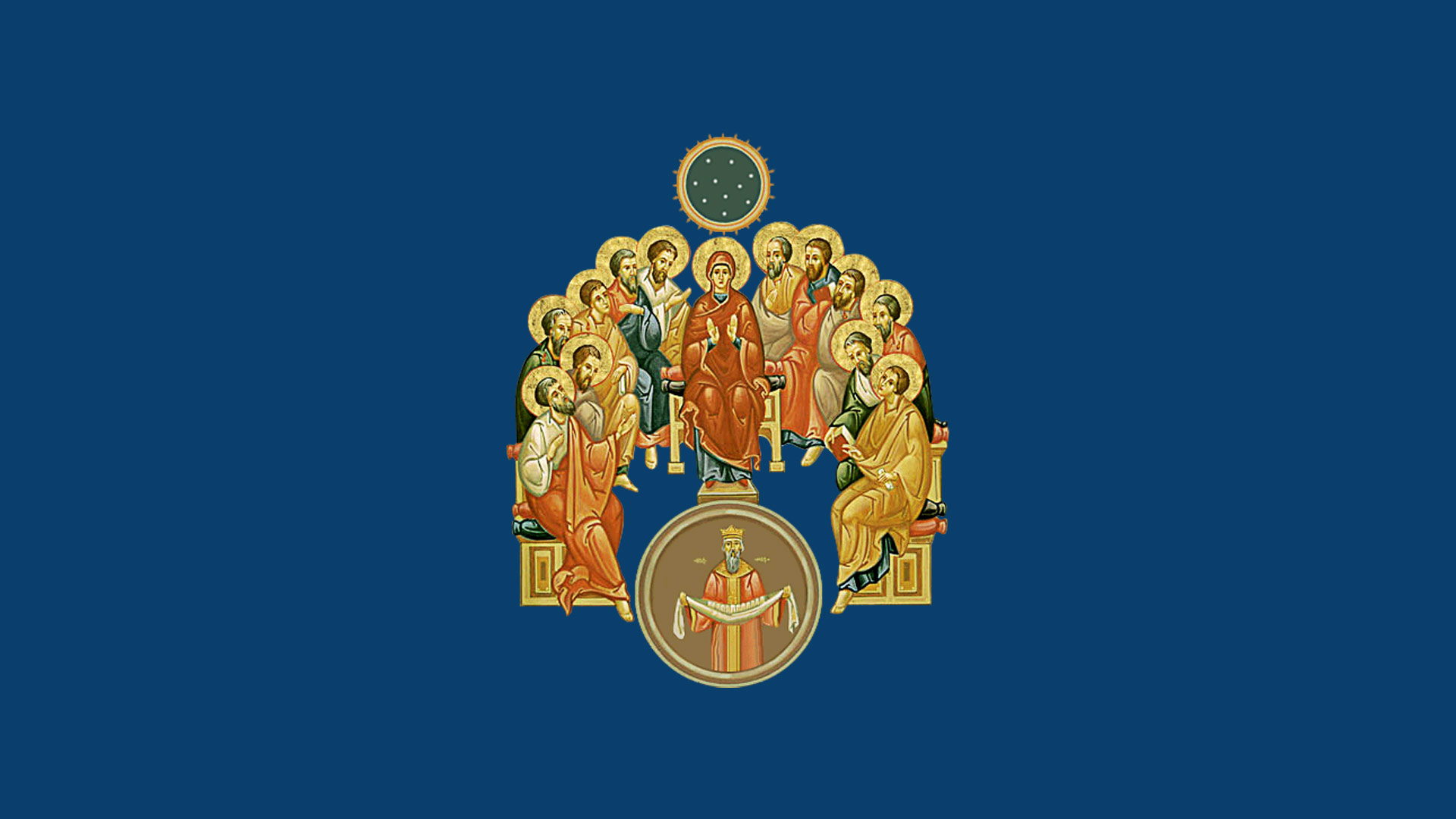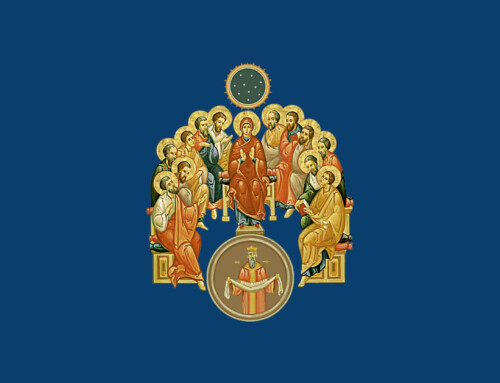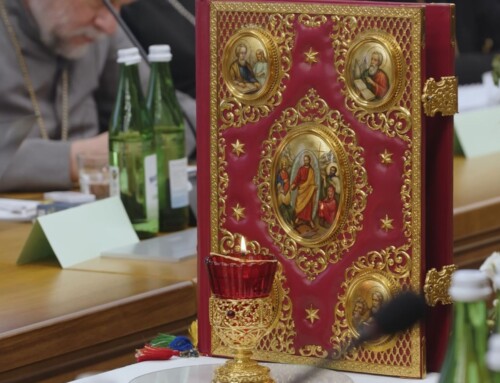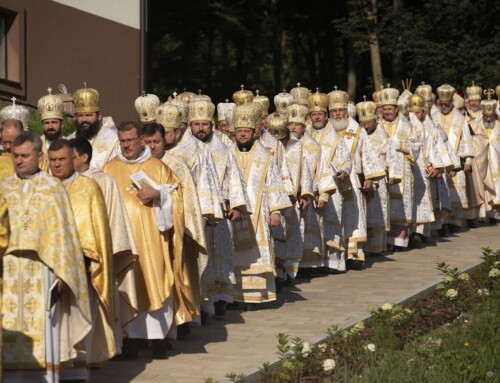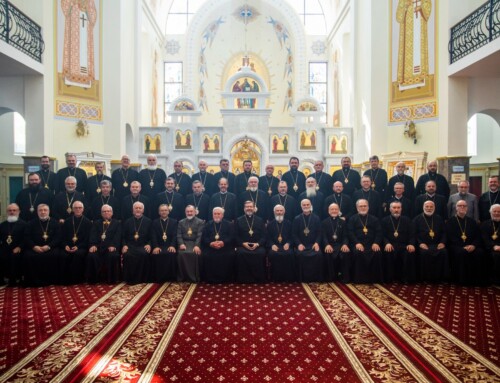“Overcome evil with good!” (Rom. 12:21)
Pastoral Letter of the 2022 Synod of Bishops of the Ukrainian Greek-Catholic Church to the Clergy, Monastics and Laity of the UGCC and to All People of Good Will
Greater love has no one than this, that someone lay down his life for his friends (Jn. 15:13).
Beloved in Christ!
For the fifth month, a large-scale, brutal war has been taking place on Ukrainian soil. It came uninvited and perfidious already in 2014, and from February 24, the enemy took off all his previous masks and openly destroys Ukraine.
The russian army kills the innocent and rapes the defenseless, kidnaps children and deports the occupied, tortures prisoners and starves the besieged, steals the grain we grow and loots our homes, annexes lands and destroys seized enterprises, fires at peaceful cities and terrorizes residents. The russian leadership seeks to destroy Ukrainian statehood and deprive us of our name. “You have eyes and heart only for your dishonest gain, for shedding innocent blood, and for practicing oppression and violence” (Jer. 22:17). Again, as in the 20th century, the territory of our Fatherland has turned into “bloody lands.”
We strongly condemn this war! Because “the way of the wicked is an abomination to the LORD” (Prov. 15:9). The world has a moral obligation to turn back this aggression against Ukraine!
The aggressor’s intentions are plainly genocidal: from the first days, the war tactics show that he is not fighting the army, but the people. Russia is trying to satisfy its imperial appetites: its leadership considers Ukraine a colony, a not-a-state that is not worthy of a place on the political map of the world. To be great, an empire needs colonies—enslaved, conquered lands, resources, slaves. Colonial genocidal logic dictates scorched earth tactics that spare no one and nothing. It holds nothing sacred—neither the elderly person, nor the pregnant woman, neither the baby in a maternity hospital, nor children hiding in a theatre. It sees no value in a historical monument or industrial city, a residential building with hundreds of residents or hectares of ripe grain. Everyone and everything can be destroyed “for the sake of operational tasks.” Every day, as if in a daze, the whole world contemplates the barbarism, moral decay, and vileness of the attackers. Ukraine, on the other hand, defends itself, because its people, once and for all, have refused to become slaves, they simply strive to live their God-given life and God-given dignity in freedom. No one dares to take this away from him – thus says the Lord.
Ukraine does not want to conquer or humiliate russia. It wants the aggressor neighbour—having a territory 28 times larger, stretching across 11 time zones, and a population almost four times larger—to stop its centuries-old attempts to enslave and destroy Ukraine, to free itself from the pathology of imperialism and become a law-based state that respects the rights of others. The thief must leave our house! The Russian Orthodox Church must stop ideologically promoting the heresy of the “Russian world”! At a time when various Christian Churches are rethinking with repentance their historical role in the policy of colonialism and the practice of slavery, the Russian Orthodox Church is leading its faithful into the moral darkness of violence, aggression, and war crimes. The salt has lost its taste, and the light has stopped shining (cf. Mt. 5:13-16).
The war of the invader has caused a humanitarian and ecological catastrophe, an economic and demographic crisis in our country. In five months, up to nine million residents have left Ukraine, in particular, two million adults and children have been forcibly deported by the occupier to russia, and an estimated seven million have been forced to become internally displaced persons, 15.6 million are in need of humanitarian support. Thousands of families are separated by kilometres and borders. The number of widows and orphans is increasing daily. The aggressor is doing everything to turn our Fatherland into an uninhabitable territory, cities and regions remain deserted. The scale of this massive demographic shift is beyond our comprehension, but we will feel its effects for decades.
The tragedy of the war has profoundly wounded our Church directly. Some of our parishes are occupied and plundered. After all, over the past centuries, every time the boot of the russian occupier—be it tsarist, Soviet, or putinian—stepped on our land, the Ukrainian Greek-Catholic Church was persecuted and destroyed. However, each time, bearing witness to her faith and showing endurance in persecution, by the Lord’s will she was restored with a new strength. We believe and know that it will be so this time as well. We express solidarity and support to our bishops, priests, consecrated persons, lay faithful, who are on the front lines and in the occupied territories, or have been forced to leave their homes and parishes. We believe that you will return to your homes, and our parishes will revive and develop. We express words of brotherhood and solidarity to the Roman Catholics, Orthodox, Protestants, Jews, and Muslims of Ukraine, who are under mortal threat no less than we. We stand together!
The courage and unity of our people in defending their independence has been unexpected even for many Ukrainians, not to mention for other countries. Heroic military resistance, dedication and sacrifice of volunteers, unity, and unanimity of religious communities, which have turned into important centres of mutual aid and love for one’s neighbour, provide proof that such a people cannot be enslaved.
They wanted to bury us, but they did not know that we are seeds. This saying has become a slogan of the indomitability, resilience, and strength of resistance to difficulties that Ukrainians are demonstrating. It echoes the saying of the Christian writer Tertullian: “The blood of the martyrs is the seed of the Church.” We bow our heads to all those who have sacrificed and are sacrificing themselves to protect the innocent, to defend the truth, to stand up for our sacred God-given human dignity.
Tremendous painful sacrifice, because it is authentic and paschal, bears abundant, life-giving fruit. In the midst of death, which the enemy sows everywhere using his full arsenal of malice and hatred, emerge sprouts of immeasurable strength and nobility. God has ignited the souls of Ukrainians with faith in the victory of God’s truth. In an era of relativistic dictatorship, Ukrainians clearly call things by their name: there is truth, goodness, principles, and values by which one should live and for which one can even die, and there are lies and insidious evil. Ukraine has united Europe, healing its cracks, and inspired people of goodwill all over the world. The Sacred Scriptures come alive before the eyes of humanity, and the Lord of history manifests a miracle: David confronts Goliath. Ukrainian soldiers who protect from the onslaught their hometowns, the lives of relatives and loved ones, the freedom and dignity of the people, together with David say: “You come to me with a sword and with a spear and with a javelin, but I come to you in the name of the LORD of hosts… whom you have defied” (1 Sam. 17:45). We express our sincere recognition to all those who selflessly stand for truth and justice.
We thank the priests-chaplains who, risking their lives, stand alongside our defenders, pray with them, carry Christ to them and provide humanitarian support.
Through her suffering and desperate struggle for existence, Ukraine has become the epicentre of global changes. Many people and nations are losing their blinders: it becomes clear that cheap resources are not worth the cost of enabling dictators; that the world security system is weakened and peace is threatened if, for the sake of prosperity, attention is not paid to divine principles and the behaviour of violators is ignored; that no man or country is a distant island, but that all humanity is interconnected at different levels, and if injustice is done to one country, others cannot be indifferent. “Never again” is transformed from a historical slogan into a moral imperative.
By God’s will, the truth has become clear, and the lie has faded away, because “no lie is of the truth” (1 John 2:21). The very fact of russia’s unprovoked aggression, reinforced by the war crimes of the russian occupiers, has caused a huge wave of support for Ukrainians in the world. The unprecedented level of humanitarian assistance to refugees and temporarily displaced persons is an authentic testimony to Christian love: “I was a refugee, and you received Me; I was in trouble, and you came to Me” (cf. Mt. 25:35-36). For this hospitality and generosity of various peoples, Churches, bishops, priests, monks and nuns, lay faithful and people of good will in various countries on various continents we express our deep gratitude. We also express our sincere thanks to the monasteries, religious orders, and congregations in Ukraine and abroad, that have accepted thousands of forcibly displaced persons and share with them everything they have. As in the times of the first Christian communities, the abundance in some overcame the need in others (cf. 2 Cor. 8:14).
These days, we ask ourselves: What gives us the strength to fight and resist an enemy who outnumbers us tenfold in military might? If we revise the question to “Who” gives us the strength, then the answer becomes obvious. God gives us strength because He is the Lord of powers. Why? Because we love! The power of Ukrainians is the power of love. Our soldiers are guided by the principle, not of hating others, but of love for their own— children, loved ones, parents, friends, land, native streets, morning dawns, fogs… Love is manifested in the tireless work of volunteers, in the generous donations of millions, in sincere silent prayer. And through this love we have already won.
This moral high ground must be preserved. We will ultimately win only if we continue to love, if we do not deviate one iota from the biblical formula for this victory: “We know that we have passed out of death into life, because we love the brothers. Whoever does not love abides in death” (1 John 3:14). Love gives birth to heroes, and hate—criminals. The cruelty of war dehumanizes, and so we, as a nation defending itself and as a Church uniting the people in Christ’s family, must make every effort to preserve our dignity and humanity, without ever stooping down to the inhumanity and atrocities of the aggressor. Let us protect the hearts of our soldiers from evil, so that they remain warriors of light and goodness! Let us safeguard our own hearts! Let us turn our anger and resentment into courage, indomitability, true wisdom, and the victory of God’s truth. St. Paul urges us: “Do not be overcome by evil, but overcome evil with good” (Rom. 12:21).
How to be Church?
The principles which we adopted in the Pastoral Letter of 2021, “The Hope to Which the Lord Calls Us,” reflecting on our future and establishing the pastoral priorities of our Church for the next decade, are brought to the fore and acquire particular meaning against the backdrop of the war. Drawing on the experience of the pandemic, which deeply affected social bonds and structures, we emphasized the need for pastoral conversion, for building networks of communion, for healing wounds and for closeness and practical attention to the poor and marginalized. Based on the experience of our communities, we sought to describe a methodology, and the war created a context in which each of us can reflect more deeply on what this methodology and these principles mean and to what practical conclusions and actions they lead.
Our pastoral conversion will mean being close to our faithful—in suffering, grief, trials, death. “If one member suffers, all suffer together” (1 Cor. 12:26). The expression “smell like the sheep” returns to its original, radical Christian meaning—to give one’s life for the entrusted sheepfold. The war prompts us to continue building bonds of solidarity between people, parishes, and countries with new fervour and resilience; new, hitherto unheard-of, wounds will require persistent prayer and generous labour from everyone, so that with the oil of divine mercy and human compassion they might be healed and transformed into sources of hope; while helping the poor and marginalized will require from us new approaches and creativity in love.
In October 2021, at the opening of the Synod of Bishops of the Catholic Church, Pope Francis emphasized that we are called to unity, communion, brotherhood, which appear precisely when we realize that we are all equally embraced by God’s love. In other words, our unity or solidarity is not a social construct, but our identity in response to God’s love. “He who does not love does not know God, for God is love” (1 Jn. 4:8).
War radically teaches us, through the pain, sacrifices, and grief it brings each day, to be the Church of Christ: to believe unshakably in the power of good and to live with active love. “For he who does not love his brother whom he has seen cannot love God whom he has not seen” (1 Jn. 4:20).
We are called to be a Church that is close
In Ukraine and abroad, our parishes create networks of prayer and support. Along with prayers for peace, rescue, the wounded and fallen, appeals resound to collect donations, find volunteers, pack and unpack material resources. The difficult, meticulous work continues. Through the witness of the Church and our faithful in different countries of the world, the truth is being spread and the awareness of what people in Ukraine are experiencing grows. A church that is close to suffering, to human grief, is alive and will not become a museum.
We are called to be a Church that listens
Chaplains and priests, representatives of monasticism or lay faithful, who worked with those who survived occupation, shelling, mutilation, or loss of relatives, note that the most important words of consolation are “I am with you!” Contact, attention, humaneness, prayer—these are the main tools for pastoral care in time of war. To listen to the other, to hear his or her story, to accept his or her pain—in our circumstances this is what it means to be Church.
We are called to be a Church that heals wounds
During his earthly mission, Christ healed the blind, crippled, possessed, in order to ultimately heal humanity and every human being from the disease of death and sin. Christ handed over to the Church his ministry of healing wounds, of making others whole. In time of war the healing of spiritual wounds, of dealing with trauma and stress is one of the primary tasks of the Church and its ministers. “Bear one another’s burdens, and so fulfil the law of Christ” (Gal. 6:2). The wounds and traumas of the people we are called to serve are mostly visible and obvious, but sometimes they are hidden or wrapped up in bandages of anger, fear, feigned detachment.
The Church, being herself wounded by the suffering and pain of the disaster of war, is called to bring to every destitute and wounded person the medicinal grace of the Holy Spirit in the Holy Mysteries (Sacraments) and in spiritual accompaniment, the medicine of consolation and merciful love. In human wounds we recognize the wounds of our Saviour, and, in touching human suffering, we rediscover contact with the risen Christ, whose wounds became a sign of God’s ultimate victory over the dark and destructive forces of sin.
Thus, in his Son, crucified for the sins of all people and raised from the dead by the power of the Holy Spirit, God the Father Himself comes to meet His suffering children and turns human patience into a source of hope and eternal life. The word of God through the mouth of the holy apostle Paul assures us of this: “Now if we have died with Christ, we believe that we will also live with him. We know that Christ, being raised from the dead, will never die again; death no longer has dominion over him. For the death he died he died to sin, once for all, but the life he lives he lives to God.” (Rom. 6:8-10).
We are called to be a Church that prays for peace and seeks justice
“Peace I leave with you; my peace I give to you. Not as the world gives do I give to you” (Jn. 14:27). Peace is one of the gifts of the Holy Spirit, and in the midst of the pain of daily distressing news, the Church ceaselessly beseeches the Lord for peace for a long-suffering Ukraine and works together with others for the restoration of peace and justice in our land.
We are called to be a Church that gives hope
We, Christians, are people of hope not because we “hope for something better,” but because we believe in God and in the eternal life to which the Lord invites us. “Hope does not put us to shame, because God’s love has been poured into our hearts through the Holy Spirit who has been given to us” (Rom. 5:5). Paradoxically, it is precisely this faith that allows us fully and deeply to experience earthly events, this war in particular. From the perspective of eternity, everyday reality is not blurred, but, on the contrary, it acquires clear contours, the sacred value of each person is brought to the fore.
***
Dear Brothers and Sisters in Christ! Because of the pandemic, we, the bishops of the UGCC, have not seen each other in person in three years. However, the joy of our brotherly meeting has been overshadowed by the horrors of war. It was the war, the suffering it inflicts on our people, and the latest challenges caused by russian military aggression against our Fatherland, that were at the centre of our prayers, conversations, and synodal meetings. In addition, during this year’s session of the Synod, we reflected on the topic “Synodality and sobornist: the experience of the UGCC.” In the context of the present circumstances, this is not an abstract topic. On the contrary, the calamity that our state and our people are experiencing called on us to rediscover the power of unity and the need for daily and enduring solidarity for the sake of victory. “In unity is the strength of the people. God, give us unity!” We felt even more keenly that we were called to strengthen unity within the country, and to support our faithful and all people of good will outside its borders.
May the power and action of the Holy Spirit give us unshakable unity and faith in the victory of God’s truth!
May the Lord strengthen and bless our defenders, volunteers, doctors, employees of the State Emergency Service, the lawful government of Ukraine and all those who protect and liberate Ukraine from the aggressor!
May He embrace the families of those who have died, the orphans and widows, the prisoners and the missing in action!
May He grant eternal reward and fullness of life to the fallen!
May the oil of merciful love heal the physical, mental, and spiritual wounds of the victims!
Through the prayers of the Most Holy Theotokos and all the saints of the land of Ukraine, may He bestow his peace and blessings on the whole world!
The blessing of the Lord be upon you!
On behalf of the Synod of Bishops of the
Ukrainian Greek-Catholic Church
† SVIATOSLAV
Given in Przemyśl,
at the Cathedral of the Nativity of St. John the Baptist,
on the Day of the Placing of the Precious Robe of
Our Most Holy Lady and Theotokos in Blachernae,
on July 15, 2022 A.D.
«Перемагай зло добром!» (Рим. 12, 21)
Послання Синоду Єпископів Української Греко-Католицької Церкви 2022 року до духовенства, монашества та мирян УГКЦ і всіх людей доброї волі
Ніхто неспроможен любити більше, ніж тоді, коли він за своїх друзів своє життя віддає (Ів. 15, 13).
Дорогі в Христі!
Уже п’ятий місяць на українській землі йде широкомасштабна жорстока війна. Вона прийшла непроханою і віроломною ще 2014 року, а починаючи з 24 лютого ворог скинув усі свої дотеперішні маски та відкрито нищить Україну.
Російська армія вбиває невинних і ґвалтує беззахисних, викрадає дітей і депортує окупованих, катує ув’язнених і морить голодом заблокованих, краде вирощене нами збіжжя і мародерствує в наших оселях, анексує землі й нищить захоплені підприємства, обстрілює мирні міста і тероризує мешканців. Російське керівництво прагне зруйнувати українську державність і позбавити нас нашого імені. «Їхні очі та їхнє серце тільки й дбають про наживу, а ще про те, як би кров безвинну пролити та як би утиск і насильство чинити» (Єр. 22, 17). Знову, як і в ХХ столітті, територія нашої Батьківщини перетворилася на «криваві землі».
Цю війну ми рішуче засуджуємо! Бо «огидна Господеві дорога злого» (Прип. 15, 9). Цю агресію проти України світ має моральний обов’язок відвернути!
Наміри агресора явно геноцидні: тактика ведення війни з перших днів показує, що він воює не з армією, а з народом. Росія намагається задовольнити свої імперські апетити: її керівництво вважає Україну колонією, недодержавою, яка не гідна місця на політичній мапі світу. Щоб бути великою, імперії потрібні колонії – поневолені, підкорені землі, ресурси, раби. Колоніальна геноцидна логіка диктує тактику випаленої землі, яка не шкодує нікого і нічого. Ні літня людина, ні вагітна жінка, ні немовлятко в пологовому будинку, ні діти, які ховаються в театрі, не є для неї святістю. Жодна історична пам’ятка чи індустріальне місто, житловий будинок із сотнями мешканців чи гектари достиглого зерна не є для неї цінністю. Всіх і все можна нищити «раді поставлених задач». Щоденно весь світ у заціпенінні споглядає варварство, моральний занепад і ницість нападників. Україна ж захищається, бо її народ раз і назавжди відмовився стати рабом, прагне просто вільно жити Богом даним життям та Богом даною гідністю. Цього ніхто не сміє в нього відібрати – так говорить Господь.
Україна не бажає підкорити чи принизити росію. Вона хоче, щоб сусід-агресор – який має у 28 разів більшу територію, що простягається на 11 часових зонах, і майже в чотири рази більше населення – припинив свої столітні спроби поневолення і нищення України, звільнився від патології імперіалізму і став правовою державою, що поважає права інших. Злодій має піти з нашої хати! Російська Православна Церква має припинити ідеологічно пропагувати єресь «руского міра»! У час, коли різні християнські Церкви з покаянням переосмислюють свою історичну роль у політиці колоніалізму і практиці рабства, РПЦ провадить своїх вірних у моральну пітьму насилля, загарбництва і воєнних злочинів. Сіль звітріла, а світло перестало світити (пор. Мт. 5, 13–16).
Війна загарбника спричинила в нашій країні гуманітарну і екологічну катастрофу, економічну і демографічну кризу. За п’ять місяців Україну покинули до дев’яти мільйонів мешканців, зокрема два мільйони дорослих і дітей були примусово вивезені окупантом до росії, і близько семи мільйонів змушені стати внутрішніми переселенцями, 15, 6 мільйона потребують гуманітарної підтримки. Тисячі сімей розділені кілометрами і кордонами. Число вдів і сиріт щодня зростає. Агресор робить усе, щоб перетворити нашу Батьківщину на територію, не придатну для життя, залишаються спустілими міста і райони. Масштаби цього масивного демографічного зсуву нам годі охопити, але його наслідки ми відчуватимемо десятиліттями.
Трагедія війни безпосередньо боляче зранила нашу Церкву. Частина наших парафій окупована і сплюндрована. Зрештою, за останні століття щоразу, коли черевик російського окупанта – чи то царського, чи то радянського, чи путінського – ступав на нашу землю, Українська Греко-Католицька Церква була переслідувана та нищена. Проте вона щоразу, даючи свідчення віри і витривалості в переслідуваннях, з Господньої волі з новою силою відновлювалася. Віримо і знаємо, що так буде і цього разу. Висловлюємо солідарність і підтримку нашим єпископам, священникам, богопосвяченим особам, мирянам, які перебувають на лінії боїв та на окупованих територіях або змушені були покинути свої помешкання і парафії. Віримо, що ви повернетеся до рідних місць, і наші парафії відродяться і розвиватимуться. Висловлюємо слова братерства і солідарності римо–католикам, православним, протестантам, євреям і мусульманам України, які перебувають під смертельною загрозою не менше від нас. Ми стоїмо разом!
Несподіваними навіть для багатьох українців, не кажучи вже про інші країни, стали мужність і єдність нашого народу в обстоюванні своєї незалежності. Героїчний військовий спротив, самовідданість і жертовність добровольців та волонтерів, єдність і одностайність релігійних громад, що перетворилися на важливі осередки взаємодопомоги та любові до ближнього, доводять, що такий народ поневолити неможливо.
Вони хотіли поховати нас, але не знали, що ми – насіння. Це прислів’я стало гаслом нескореності, живучості та сили протистояння труднощам, які демонструють українці. Воно перегукується з висловом християнського письменника Тертуліана: «Кров мучеників – насіння Церкви». Ми схиляємо голови перед усіма, хто приніс і приносить себе в жертву, щоб захищати невинних, боронити правду, обстоювати Богом дану священну людську гідність.
Велика болісна жертва, оскільки вона правдива і пасхальна, дає рясні, життєдайні плоди. Серед смерті, яку повсюдно сіє ворог, використовуючи весь арсенал злоби і ненависті, проростають паростки неосяжної сили і шляхетності. Бог запалив душі українців вірою в перемогу Божої правди. В епоху диктатури релятивізму українці чітко називають речі своїми іменами: є істина, добро, принципи і цінності, за якими слід жити і за які можна навіть померти, а є брехня і лукаве зло. Україна об’єднала Європу, зцілюючи її тріщини, і надихнула людей доброї волі в усьому світі. Перед очима людства оживає Святе Письмо, і Господь історії увиразнює чудо: Давид протистоїть Голіяту. Українські воїни, які захищають від навали рідні міста, життя рідних і близьких, свободу та гідність народу, разом з Давидом кажуть: «Ти йдеш на мене з мечем і довгим списом і коротким. Я ж іду на тебе в ім’я Господа Сил… якого ти зневажив» (1 Сам. 17, 45). Ми висловлюємо щире визнання всім, хто жертовно стоїть за правду і справедливість.
Дякуємо отцям-капеланам, які, ризикуючи життям, перебувають поруч із нашими захисниками, моляться з ними, несуть їм Христа та дбають про гуманітарну підтримку.
Через страждання і відчайдушну боротьбу за своє існування Україна стала епіцентром глобальних змін. У багатьох людей і народів спадає полуда з очей: стає зрозумілим, що дешеві ресурси не варті підтримки диктаторів; що світова система безпеки ослаблюється і мир є під загрозою, якщо заради добробуту не звертати уваги на Божі принципи і поведінку порушників; що жодна людина чи країна не є далеким островом, а все людство на різних рівнях взаємопов’язане, і якщо чиниться несправедливість щодо однієї країни – інші не можуть бути байдужими. «Ніколи знову» з історичного гасла перетворюється на моральний імператив.
З волі Божої правда увиразнилася, а брехня – зів’яла, бо «ніяка брехня не походить від правди» (1 Ів. 2, 21). Сам факт нічим не спровокованої агресії з боку росії, підкріплений воєнними злочинами російських окупантів, викликав у світі величезну хвилю підтримки українців. Безпрецедентний рівень гуманітарної допомоги біженцям і тимчасово переміщеним особам є автентичним свідченням християнської любові: «Біженцем був, і ви Мене прийняли; в біді був, і ви прийшли до Мене» (пор. Мт. 25, 35-36). За цю гостинність і щедрість різних народів, Церков, єпископів, священників, монахів і монахинь, мирян і людей доброї волі в різних країнах на різних континентах висловлюємо глибоку вдячність. Ми також складаємо щиру подяку монастирям, чернечим чинам і згромадженням в Україні і за кордоном, які прийняли тисячі вимушено переселених осіб і діляться з ними всім, чим мають. Як і в часи перших християнських спільнот, надмір в одних людей покрив нестачу в інших (пор. 2 Кор. 8, 14).
Цими днями ми питаємо себе: що дає нам силу боротися і протистояти ворогові, який переважає нас у десять разів у військовій потузі? Якщо ж відкоригувати саме запитання – «хто» дає нам силу, то відповідь стає очевидною. Силу дає нам Бог, бо Він є Господом сил. Чому? Бо ми любимо! У моці українців виявляється сила любові. Наші воїни керуються принципом не ненависті до чужого, а любові до свого – дітей, коханих, батьків, друзів, землі, рідних вулиць, світанків, туманів… Любов виявляється в невтомній праці волонтерів, у щедрих пожертвах мільйонів, у щирій тихій молитві. І в цій любові ми вже перемогли.
Цю моральну висоту слід зберегти. Остаточно переможемо лише тоді, коли продовжуватимемо любити, коли ні на йоту не відступимо від біблійної формули цієї перемоги: «Ми знаємо, що ми перейшли від смерти до життя, бо любимо братів. Хто не любить, той у смерті перебуває» (1 Ів. 3, 14). Любов народжує героїв, а ненависть – злочинців. Жорстокість війни дегуманізує, тому ми, як народ, що захищається, і Церква, що гуртує народ у Христову родину, мусимо докладати всіх зусиль, щоб зберегти свою гідність і людяність, у жодному разі не опустившись до нелюдяності та звірств агресора. Бережімо серця наших воїнів від зла, щоб вони залишалися воїнами світла і добра! Бережімо свої серця! Перетворюймо свій гнів і кривду на мужність, незламність, правдиву мудрість і перемогу Божої правди. Святий Павло закликає «Не дозволь, щоб зло тебе перемогло, але перемагай зло добром» (Рим. 12, 21).
Як бути Церквою?
На тлі війни увиразнюються та набувають особливої ваги принципи, до яких ми зверталися у посланні 2021 року «Надія, до якої нас кличе Господь», роздумуючи над нашим майбутнім і визначаючи душпастирські пріоритети нашої Церкви на наступне десятиліття. Відштовхуючись від досвіду пандемії, що глибоко вразила соціальні зв’язки та структури, ми наголошували на необхідності душпастирського навернення, розбудови мереж сопричастя, зцілення ран та близькості та практичної уваги до вбогих і маргіналізованих. Спираючись на досвід наших спільнот, ми намагалися описати методологію, а війна створила контекст, у якому кожен із нас може глибше замислитися, що ця методологія і ці принципи означають і до яких практичних висновків та дій ведуть.
Наше душпастирське навернення означатиме бути поруч із нашими вірними – у стражданнях, горі, випробуваннях, смерті. «Як страждає один член, страждають усі з ним члени» (1 Кор. 12, 26). Вислів «пахнути вівцями» повертається до свого оригінального, радикального Христового змісту – віддати своє життя за довірену кошару. Війна спонукає нас із новим запалом і стійкістю продовжувати розбудовувати зв’язки солідарності між людьми, парафіями і країнами; нові, нечувані досі, рани вимагатимуть від усіх витривалої молитви та великодушної праці, щоб олією Божого милосердя і людського співчуття зцілювати їх та перетворювати на джерела надії; а допомога вбогим і маргіналізованим вимагатимуть від нас нових підходів і творчості в любові.
У жовтні 2021 року, відкриваючи Синод Єпископів Католицької Церкви, Папа Франциск наголосив, що ми покликані до єдності, сопричастя, братерства, які з’являються саме тоді, коли ми усвідомлюємо, що всіх нас обіймає одна Божа любов. Тобто наша єдність чи солідарність є не соціальним конструктом, а нашою ідентичністю у відповідь на Божу любов. «Хто не любить, той не спізнав Бога, бо Бог – любов» (1 Ів. 4, 8).
Війна радикально вчить нас через біль, жертви і горе, які вона щодня приносить, бути Церквою Христовою: непохитно вірити у силу добра і жити діяльною любов’ю. «Бо хто не любить брата свого, якого бачить, той не може любити Бога, якого він не бачить» (1 Ів. 4, 20).
Ми покликані бути Церквою, яка є близькою
В Україні і за кордоном наші парафії творять мережі молитви та підтримки. Разом з молитвами за мир, порятунок, поранених і полеглих лунають оголошення про збір пожертв, пошук волонтерів, пакування і розпаковування матеріальних засобів. Триває кропітка, муравлина праця. Через свідчення Церкви і наших вірних у різних країнах світу поширюється правда і зміцнюється усвідомлення того, що переживають люди в Україні. Церква, яка близька до страждання, до людського горя, є живою і музеєм не стане.
Ми покликані бути Церквою, яка слухає
Капелани і священники, представники монашества чи миряни, які працювали з тими, хто пережив окупацію, обстріли, каліцтва чи втрату рідних, зазначають, що найважливіші слова розради – «я з тобою». Контакт, увага, людяність, молитва – це головні способи душпастирювання під час війни. Вислухати іншого, почути його історію, прийняти його біль – це в наших обставинах означає бути Церквою.
Ми покликані бути Церквою, яка зцілює рани
Протягом своєї земної місії Христос оздоровлював сліпих, розслаблених, біснуватих, щоб остаточно зцілити людство і людину від недуги смерті та гріха. Своє служіння гоїти рани, оздоровлювати, зцілювати Христос передав Церкві. Під час війни зцілення духовних ран, протидія травмі та стресу – одне з першочергових завдань Церкви та її служителів. «Носіте тягарі один одного й тим робом виконаєте закон Христа» (Гал. 6, 2). Рани і травми людей, яким ми покликані служити, здебільшого видимі й очевидні, а часом приховані чи перемотані пов’язками злості, страху, вдаваної відстороненості.
Церква, будучи сама зраненою стражданнями і болем воєнного лихоліття, покликана нести кожній знедоленій і зраненій людині ліки благодаті Святого Духа у Святих Таїнствах та духовного супроводу, ліки розради і милосердної любові. У людських ранах розпізнаємо рани нашого Спасителя, а, торкаючись людського страждання, віднаходимо контакт з Христом воскреслим, рани якого стали знаком остаточної перемоги Бога над темними і руйнівними силами гріха.
Так, у своєму Синові, розп’ятому за гріхи всіх людей і воскреслому з мертвих силою Святого Духа, сам Бог Отець виходить назустріч своїм стражденним дітям і перетворює людське терпіння на джерело надії та вічного життя. Про це нас запевняє Боже слово устами святого апостола Павла: «Коли ж ми вмерли з Христом, то віруємо, що й житимемо з Ним, знаючи, що Христос, воскреснувши з мертвих, вже більше не вмирає: смерть над Ним більше не панує. Вмираючи бо, Він умер для гріха раз назавжди, а живучи, живе для Бога» (Рим. 6, 8–10).
Ми покликані бути Церквою, що молиться за мир і шукає справедливості
«Мир залишаю вам, Мій мир даю вам» (Ів. 14, 27). Мир є одним із дарів Святого Духа, і посеред болю щоденних тривожних новин Церква неустанно благає Господа про мир для багатостраждальної України і разом з іншими працює заради відновлення миру і справедливості на нашій землі.
Ми покликані бути Церквою, яка дає надію
Ми, християни, є людьми надії не тому, що «сподіваємося на краще», а тому що віримо в Бога і вічне життя, до якого Господь нас запрошує. «Надія ж не засоромить, бо любов Бога влита в серця наші Святим Духом, що нам даний» (Рим. 5, 5). Парадоксально, але саме ця віра дозволяє нам уповні і глибоко переживати земні події, зокрема цю війну. У перспективі вічності щоденне не розмивається, а навпаки, набуває чітких обрисів, усвідомлюється священна цінність кожної людини.
***
Дорогі в Христі брати і сестри! Ми, єпископи УГКЦ, через пандемію не бачилися наживо вже три роки. Однак радість нашої братньої зустрічі затьмарена страхіттями війни. Саме війна, страждання, які вона завдає нашому народові, та новітні виклики, спричинені російською воєнною агресією проти нашої Батьківщини, були в центрі наших молитов, розмов і синодальних нарад. Крім того, під час цьогорічної сесії Синоду ми роздумували над темою «Синодальність і соборність: досвід УГКЦ». У контексті нинішніх обставин це не абстрактна тема: навпаки, у біді, якої зазнає наша держава і наш народ, ми покликані заново відкрити силу єдності і необхідність щоденної та витривалої солідарності задля перемоги: «В єдності сила народу. Боже, нам єдність подай!». Ми ще гостріше відчули, що покликані зміцнювати єдність всередині країни та підтримувати наших вірних і всіх людей доброї волі поза її межами.
Нехай же силою і діянням Святого Духа буде нам дана непохитна єдність і віра в перемогу Божої правди!
Нехай Господь кріпить і благословить наших захисників, добровольців, волонтерів, медиків, працівників Державної служби з надзвичайних ситуацій, законну владу України і всіх, хто захищає і звільняє Україну від агресора!
Нехай пригорне родини загиблих, сиріт і вдів, полонених і пропалих безвісти!
Нехай дарує вічну нагороду і повноту життя полеглим!
Нехай єлеєм милосердної любові зцілить тілесні, душевні та духовні рани постраждалих!
За молитвами Пресвятої Богородиці і всіх святих української землі нехай Він дарує всьому світові свій мир і благословення!
Благословення Господнє на вас!
Від імені Синоду Єпископів
Української Греко-Католицької Церкви
† СВЯТОСЛАВ
Дано в Перемишлі,
при соборі Різдва святого Івана Хрестителя,
у день Положення чесної ризи Пресвятої Владичиці нашої Богородиці у Влахерні,
15 липня 2022 року Божого

